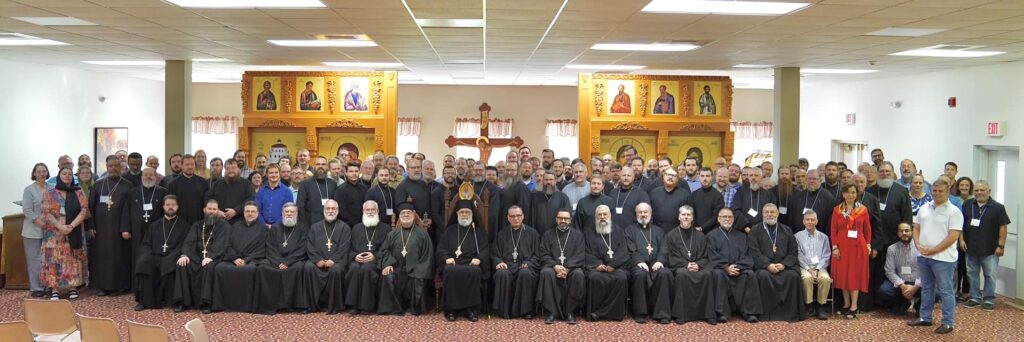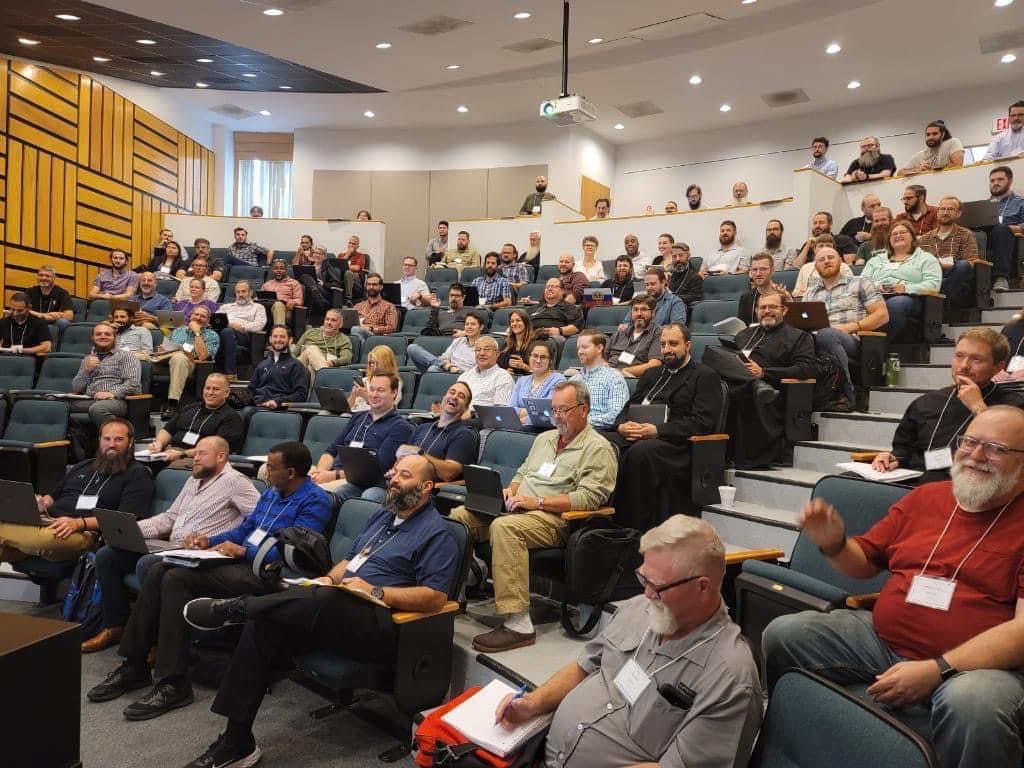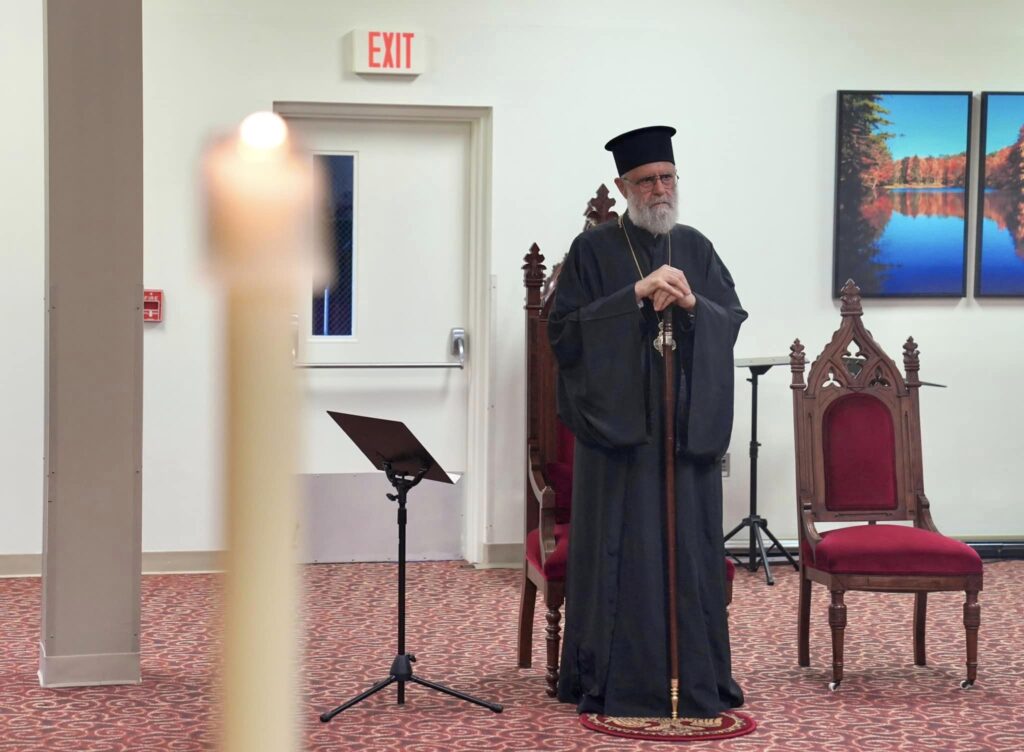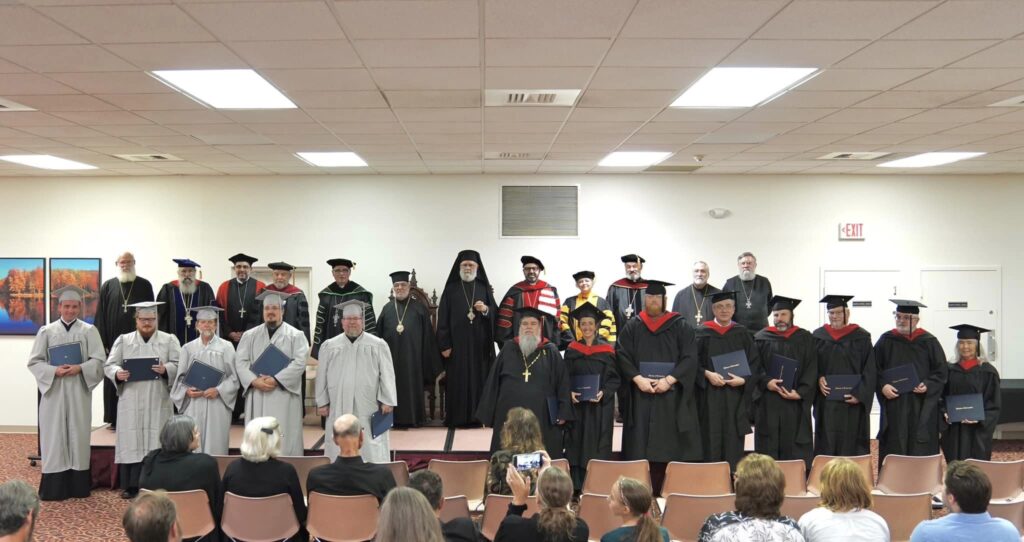
The 2025 Winer Symposium, held on January 25th via Zoom, brought together scholars, clergy, and students from the Orthodox Academic Society (OAS) and the Antiochian House of Studies (AHOS) to commemorate the 1,700th anniversary of the First Ecumenical Council of Nicaea. This biannual event, now in its sixth iteration, provided a platform for deep theological reflection, scholarly exchange, and spiritual enrichment. The symposium’s theme centered on the enduring legacy of Nicaea and its relevance to contemporary challenges facing the Orthodox faith.
Opening Reflections: A Call to Renewal

The symposium began with a warm welcome from Deacon Simeon Spencer, the OAS Coordinator, who set the tone for the day’s discussions. Following an opening prayer by Fr. Fadi Rabbat, V. Rev. Fr. Michel Najim, President of AHOS and Rt. Rev. Fr. Fadi Rabbat, Dean of AHOS gave courtly encouragement and direction.
Fr. Michel Najim: A Legacy of Faith and a Call to Vigilance
As the President of the Antiochian House of Studies (AHOS), Fr. Michel Najim delivered a stirring opening speech that connected the historical significance of the Council of Nicaea to the modern struggles of the Orthodox Church. He began by acknowledging the 1,700th anniversary of the Council, which convened in 325 AD to address the Arian controversy and affirmed the divinity of Christ.

Fr. Najim emphasized that the Council’s condemnation of Arianism was not merely a historical event but a timeless defense of the faith. He described Arianism as a “dangerous internal threat,” comparing it to a resurgence of paganism disguised as Christianity in modern time. While the early Church faced external persecution, Arianism represented a subtler, more insidious challenge—one that sought to reduce Christ to a mere created being, undermining the mystery of the Incarnation.
Drawing parallels to contemporary culture, Fr. Najim warned of a “modern Arianism” that diminishes the divinity of Christ, reducing Him to a historical figure or moral teacher. He critiqued secular humanism and religious relativism, which, he argued, distort the truth of Christ’s divinity and erode the foundations of faith. In response, he called on the Antiochian House of Studies and the broader Orthodox community to reaffirm the doctrines of the Trinity, the divinity of Christ, and theosis—the divinization of humanity.
Fr. Najim concluded with a powerful reminder of the transformative power of Orthodox Christianity. He urged attendees to embrace the legacy of Nicaea, not as a relic of the past, but as a living tradition that continues to shape the Church’s mission in the world. His speech set a tone of vigilance and renewal, challenging participants to defend the faith against modern distortions and to live out the mystery of Christ’s divinity in their daily lives.
Fr. Fadi Rabbat: Renewal Through Humility and Transformation

At the 2025 Winer Symposium, Fr. Fadi Rabbat, Dean of the Antiochian House of Studies, delivered a stirring opening speech centered on renewal, humility, and unity. Drawing from 2 Corinthians 5:17 (“Therefore, if anyone is in Christ, he is a new creation. The old has passed away; behold, the new has come.“), Fr. Fadi reminded attendees that the Christian life is one of continual transformation. He connected this theme to the legacy of the First Council of Nicaea (325 AD), which defended Christ’s divinity against Arianism and produced the Nicene Creed, a timeless statement of faith.
Fr. Fadi emphasized the need for humility, urging participants to allow the Holy Spirit to transform their hearts and minds. He called for a return to the teachings of the Church Fathers and a renewed commitment to living as “new creations” in Christ. Quoting Galatians 3:27 (“You have put on Christ”), he challenged everyone to prioritize Christ above ego and personal gain.
He also addressed the importance of unity, inviting Catholic brethren to revisit shared traditions, such as a unified celebration of Pascha, as a step toward reconciliation. Fr. Fadi concluded by encouraging attendees to live as witnesses to Christ’s love, rooted in the Eucharist and the teachings of the Church. His message set a tone of hope and renewal, inspiring all to embrace the transformative power of the Orthodox faith.
Fr. Elias Boulos: A Vision for Pastoral Care and Healing
The final opening reflection came from Fr. Elias Boulos, who introduced the Master of Pastoral Care and Counseling (MPCC) program at AHOS. Fr. Boulos began by expressing gratitude for the support of the Orthodox community and highlighting the program’s mission to equip clergy, chaplains, and lay ministers with the tools to provide Orthodox pastoral care.

He explained that the MPCC program is rooted in the Church’s ancient tradition of spiritual fatherhood and Orthodox psychotherapy. Drawing on the teachings of the Church Fathers, Fr. Boulos emphasized that pastoral care is not merely about addressing psychological or emotional needs but about guiding individuals toward healing and union with God.
Fr. Boulos outlined the program’s structure, which includes 66 credit hours, a thesis, and a focus on integrating ecclesial, ascetical, and dogmatic principles. He shared stories of how the program has already begun to impact the lives of students and their communities, enabling them to reclaim the Church’s role as a place of healing and transformation.
In closing, Fr. Boulos called on the symposium attendees to support the MPCC program and to recognize the importance of pastoral care in the life of the Church. His speech was a reminder that the legacy of Nicaea is not only about defending doctrinal truths but also about living out those truths in service to others.
Scholarly Presentations: Insights and Inspirations
The heart of the symposium lay in the five scholarly presentations, each exploring a unique aspect of Orthodox theology and its connection to the legacy of Nicaea.
1. Fr. Cosmin Sicoe: “Maker of Heaven and Earth“
Fr. Cosmin Sicoe delivered a rich and detailed presentation on the concept of “Maker of Heaven and Earth” as articulated in the Nicene Creed. His paper explored the nature of heaven, drawing heavily from the works of Dionysius the Areopagite, particularly The Celestial Hierarchy.

Fr. Cosmin began by emphasizing that heaven is not merely a physical space but also a symbol of the spiritual realm inhabited by angels and saints. He referenced St. John of Damascus to explain that angels were created before humans, possibly even before the visible world. He then delved into the three meanings of the Hebrew word for heaven, shamayim: the physical sky, the dwelling place of God, and the abode of celestial beings.
A significant portion of his presentation focused on the angelic hierarchy as described by Dionysius. Fr. Sicoe explained that angels are organized into nine ranks, grouped into three triads:
- Closest to God: Seraphim (bearers of fire), Cherubim (bearers of wisdom), and Thrones (bearers of God). These ranks directly praise God and radiate His light.
- Middle Rank: Dominions, Powers, and Authorities. These ranks transmit divine power and guide the lower ranks harmoniously.
- Final Rank: Principalities, Archangels, and Angels. These ranks mediate God’s grace to the world, with angels being the closest to humanity.
Fr. Cosmin concluded by highlighting that each angelic rank reflects qualities that humans can emulate, such as zeal for God, wisdom, and the ability to bear His presence in their daily lives.
2. Chungsoo Peter Lee: “Christ Who Sits at the Right Hand of the Father“
Chungsoo Peter Lee presented a compelling exploration of the theological significance of Christ sitting at the right hand of the Father, as stated in the Nicene-Constantinopolitan Creed. He began by referencing Psalm 110:1 and Mark 16:19, which describe Christ’s exaltation as a symbol of God’s sovereignty and power.

Peter expanded on Christ’s role as the eternal High Priest, drawing from the Epistle to the Hebrews, which portrays Christ as the mediator between God and humanity. He explained that Christ’s heavenly ministry parallels the Levitical sacrifices of the Old Testament, where the essence of sacrifice lies not in the slaughter of animals but in the offering of gifts from the mundane to the holy.
Peter referenced David M. Moffitt’s Rethinking the Atonement to emphasize that the act of offering, rather than killing, is central to sacrifice. He connected this to the Eucharist, where believers united with Christ’s eternal sacrifice, offer themselves as living sacrifices in communion with Him.
Peter concluded by highlighting that prayer, too, is a form of sacrifice, where believers pour out their hearts entirely to God, reflecting the concept of total surrender and union with Christ.
3. Marina Guevara-Trejo: “Interpretation of Scripture According to St. Maximos the Confessor“
Marina Guevara-Trejo delivered an insightful presentation on St. Maximos the Confessor’s approach to Scripture, focusing on his work Quaestiones ad Thalassium. She began by explaining that St. Maximos viewed Scripture as a divine tool designed to accommodate human limitations while containing infinite spiritual depth.

Marina highlighted St. Maximos’s interpretation of Hebrews 10:1, where he described three patterns of revelation: the shadow (Old Testament), the image (New Testament), and the reality (future fulfillment). She emphasized that Christ is the ultimate fulfillment of Scripture, transcending time and uniting all its layers of meaning.
A key aspect of her presentation was the concept of anagogical exegesis, a method of interpretation that lifts the soul toward divine realities. Guevara-Trejo explained how St. Maximos used this approach to uncover spiritual truths in seemingly obscure passages, such as the angel’s intent to kill Moses in Exodus 4:24. She noted that the goal of interpreting Scripture, according to St. Maximos, is to transform readers into participants in divine virtue.
Marina concluded by emphasizing that St. Maximos saw Scripture as a means of spiritual ascent, inviting believers to live virtuously, imitate Christ, and ultimately achieve union with God through grace.
4. Fr. Charles Nicholas Baz: “The Necessity of Saint Maximos: Confessor of Orthodoxy & Guardian of Chalcedon’s Integrity“
Fr. Charles Nicholas Baz presented a powerful account of St. Maximos the Confessor’s defense of Chalcedonian Christology against the heresy of monothelitism, which claimed that Christ had only one will. Fr. Baz began by explaining that monothelitism emerged as a political and theological compromise to unify Christian factions but ultimately undermined the integrity of the faith.

Fr. Charles detailed St. Maximos’s argument that Christ, having two natures (divine and human), must also possess two wills, harmoniously united. He emphasized that Christ’s human will freely submitted to the divine will, preserving the fullness of His humanity and divinity. This teaching, Fr. Baz noted, was crucial in reaffirming the Chalcedonian Definition and clarifying earlier misunderstandings.
The presentation also touched on St. Maximos’s personal suffering for his faith, including exile, mutilation, and martyrdom. Fr. Baz highlighted that St. Maximos’s legacy was vindicated at the Sixth Ecumenical Council (681 AD), which condemned monothelitism and upheld the doctrine of two wills in Christ.
Fr. Charles concluded by celebrating St. Maximos as a model of theological courage and fidelity to Orthodox doctrine, whose insights continue to inspire the Church today.
5. John Forman: “The Influence of the First Council of Nicaea on the Confession of Dositheus’s Response to Calvinism“
John Forman delivered a detailed presentation on the influence of the First Council of Nicaea on the Orthodox response to Calvinism in the 17th century, particularly through the Confession of Dositheus. He began by discussing Patriarch Cyril Lucaris’s attempts to reform Orthodoxy along Calvinist lines, which included emphasizing predestination and rejecting free will.

John explained that Lucaris’s 1629 Confession faced widespread opposition, culminating in the Synod of Jerusalem (1672) and the Confession of Dositheus. He highlighted how the Nicene Creed’s affirmation of Christ’s divinity and the rejection of Arianism provided a foundation for the Orthodox defense of free will and synergy—the cooperation between human effort and divine grace.
John noted that the Confession of Dositheus explicitly rejected Calvinist predestination, emphasizing that salvation involves both faith and works, in harmony with Orthodox teaching. He concluded by underscoring the enduring relevance of Nicaea’s legacy in defending the integrity of Orthodox theology against external challenges.
Closing Reflections: A Legacy of Faith
The symposium concluded with a closing prayer, marking the end of an enriching and thought-provoking gathering. The discussions reaffirmed the ongoing relevance of the First Ecumenical Council and underscored the importance of theological study in safeguarding Orthodox faith. As the Antiochian House of Studies continues its mission, events like this symposium serve as vital platforms for intellectual and spiritual growth.
More information! -> Please visit: OAS.AHOS.EDU




